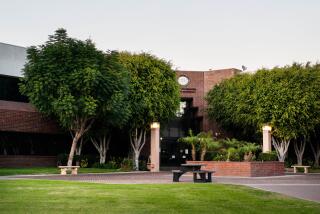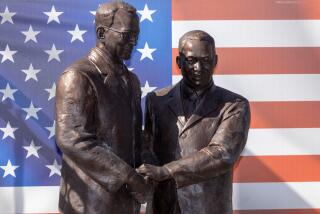Rx for King Medical Center
- Share via
In calling for patient-focused leadership at Martin Luther King Jr./Charles R. Drew Medical Center, L.A. County Supervisor Yvonne Brathwaite Burke last week finally acknowledged the hospital’s identity crisis. Does it exist mainly to serve patients or as a symbol for African Americans?
King/Drew opened in 1972 to serve the then-mostly black communities of South Los Angeles after a state commission found that a lack of access to health care was a factor in the 1965 Watts riots. The county-owned hospital partnered with the new, privately run Drew medical school to train African Americans and other minorities as physicians and encourage them to set up practice nearby. The medical center today serves an area with the highest poverty rate in the county and the highest percentage of patients without health insurance.
But though the need for care hasn’t changed, the population has. Once 80% black, it is now 40% black and 55% Latino.
It’s naive to suggest that race doesn’t matter in a nation in which black professionals in business suits still get mistaken for thugs. But at King, it is now being acknowledged, whom you knew and what you looked like mattered too much. Though many of King’s doctors and nurses are miracle workers (their expertise in trauma care comes from treating one-quarter of the county’s gunshot victims), the medical center is regarded as poorly managed by an administration that has had little turnover in 30 years.
Martin Luther King’s famous words about being judged by the content of one’s character, not the color of one’s skin, is frequently misinterpreted; he never suggested that race is irrelevant. Race does matter, but that doesn’t mean it should matter at all costs. At King, where patients were dying in part as a result of an apparent attempt to protect the racial status quo, the price became too high.
All of this must be seen in the larger context of the challenges facing historically black medical schools. Other schools that once shunned blacks now recruit top minority students, teachers and administrators. The competition, ironically, has hurt schools founded to counter discrimination.
Former U.S. Surgeon General David Satcher, asked by the county to evaluate Drew, argued for making it a model for training doctors to treat a rapidly changing, multiethnic community. His recommendation, however inspiring, may come too late for the county, whose first priority has to be to save its troubled hospital even if that means severing ties to the medical school.
Strong leaders whose decisions are driven by medical needs are crucial if either is to survive. King/Drew Medical Center must continue to serve the sick and the poor. In the last years of his too-short life, King’s crusade for economic justice embraced all those living in poverty. “We go farther, faster,” he said, “when we go together.”
More to Read
Sign up for Essential California
The most important California stories and recommendations in your inbox every morning.
You may occasionally receive promotional content from the Los Angeles Times.













